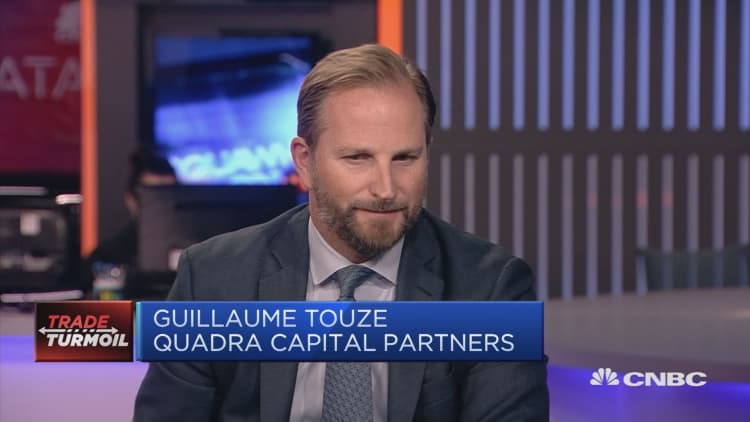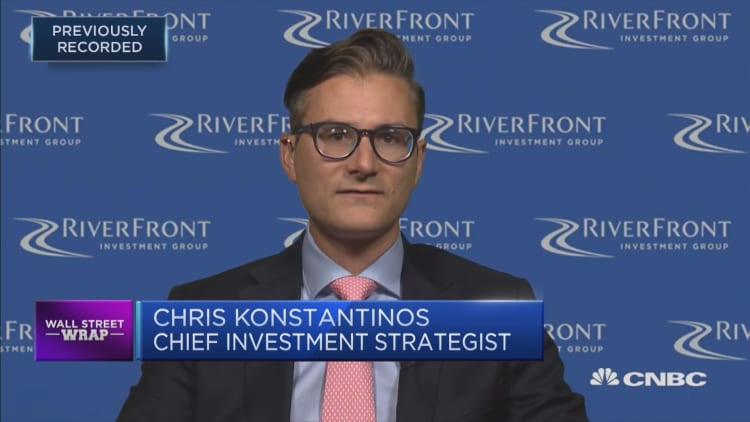
Political scandal and the backlash against major tech companies are an impending threat to American equities, the CEO of an asset management firm has warned, advising investors to short the U.S. market despite record highs.
Gillaume Touze of Quadra Capital Partners does not hold the mainstream view on booming tech stocks, many of which have seen more than 50 percent returns year-to-date.
So he raised eyebrows during an appearance Thursday on CNBC's "Squawk Box Europe" when he revealed his firm's strategy of shorting big names in the U.S. market, calling a bear market by the second half of this year.
"We believe that the volatility is going to very much remain," Touze said of major tech stocks, noting the fall in Facebook, Alphabet and Twitter's stock prices at the market's close Wednesday after U.S. lawmakers grilled tech executives on Capitol Hill over ethics and security issues. Twitter was down 6 percent on the day by the end of the hearing.
"The pressure coming from the media is likely to continue to be very tough for the FAANGs, we believe. We've been short some of those big names for quite a bit," he said, using the acronym for the market's five most popular tech stocks, namely Facebook, Apple, Amazon, Netflix and Alphabet's Google.
Quadra Capital Partners, which specializes in total return investment strategies, is currently favoring smaller names. "That volatility combined with political turmoil is making us overall short on the key markets, particularly the U.S. one," Touze said.
This is a bold argument to make, given that the FAANGs — with the exception of Facebook — have all made massive gains this year. Netflix and Amazon are up an eye-popping 81.7 and 69.6 percent, respectively, with the latter briefly hitting the $1 trillion market cap figure on Tuesday. Apple was the first company to breach the $1 trillion mark in early August. Twitter is up about 33 percent, while Facebook is down nearly 6 percent on the year, beleaguered by scandals and a dramatic 20 percent plunge in July on the back of a bad earnings call.
And the U.S. market is the standout globally as it continues to fire on all cylinders, boasting north of 4 percent growth alongside strong employment numbers and substantial fiscal stimulus.
"We were surprised by the strength of the second quarter gross domestic product (GDP) — 4 percent was more than what we expected," Touze said. But his outlook remained bearish. "We still believe that for the second part of the year, the bad news may be coming from the U.S."
The CEO noted that his firm remained invested in a number of companies in the U.S., but that, "Overall, we believe the pressure is potentially coming from there."
A bubble waiting to burst?
Touze has allies in his camp, with a growing number of market watchers calling attention to inflated U.S. stock valuations, trade war uncertainty and rising Fed interest rates as heralding the impending burst of an epic equity bubble.
Centricus Asset Management Fund Manager Ralph Jainz called the current market "the biggest asset inflation bubble in 20 years," and billionaire Jim Mellon told CNBC in late June that a "major correction" in U.S. stocks was on the horizon. And investors are at odds over whether FAANG stocks have hit a ceiling or still have room to run.
But plenty of banks and analysts continue to tout the market's strength, pointing to strong fundamentals and noting that Washington's political scandals, as headline-grabbing as they may be, have barely fazed markets at all. The S&P 500 in late August reached a record in what many deemed the longest bull market in history.

"We remain invested," said Fahad Kamal, senior market strategist at Kleinwort Hambros, Societe Generale's private banking and wealth management division, discussing highly-performing U.S. stocks. "I understand the caution, but ultimately we are long-term investors, and at the moment, repeatedly, there are very few asset classes that compare to equities."
A common assessment of the current global markets picture would point to emerging markets as the central source of risk, as higher interest rates, a stronger dollar and trade war fears have hit emerging currencies hard across the board.
But Touze warned not to be wholly distracted from potential turmoil in the U.S. "The scene is occupied by a number of other regions right now, starting with the emerging markets, but still I think the amount of volatility we see in certain stocks, following the Twitter and Facebook discussion, clearly we feel we have to be cautious on that front."
Meanwhile, he said that the user monopoly of companies like Twitter leaves them more vulnerable to political developments, such as election interference and the purported social media misinformation epidemic.
"We feel that is potentially dangerous, and that's one of the reasons we've been short on our stock for bubble and valuation reasons," Touze said. "We haven't been right recently, but we believe you have to be careful in the way you'd invest in the U.S. for the remaining part of the year for sure."


